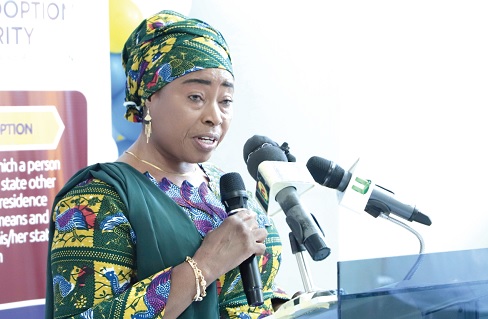
LEAP indexation mechanism introduced
The Livelihood Empowerment Against Poverty (LEAP) Secretariat has said a specialised mechanism in the payment of grants to beneficiaries of the programme to preserve the value of the allowances against inflation is to be implemented.
Known as LEAP indexation mechanism, it will take effect from this month to enable an automatic adjustment of grants to ensure that the value was not totally eroded by rising inflation.
The structural reform benchmark to index the benefits was introduced through collaborative work between the Ministry of Gender, Children and Social Protection (MoGCSP), and the Ministry of Finance (MoF), after increasing the allowances paid to beneficiaries by 100 per cent in 2023.
The initiatives are being implemented by the MoGCSP, headed by the sector minister, Lariba Zuweira Abudu.
Context
The LEAP cash transfer programme was first implemented in 2008, specifically targeting extremely poor and vulnerable households.
Since the inception and operationalisation of the LEAP programme in 2008, the benefits were first increased in January 2012, and in September, 2015.
It had, however, not kept pace with inflation over the period and the cash grant had lost its purchasing power over the years.
As part of efforts to mitigate the impact of increasing cost of living on the poor and the vulnerable, the government increased the bi-monthly LEAP benefit levels by 100 per cent in 2023.
In real terms, using 2009 prices, the LEAP benefits were reduced by 22 per cent from February 2009 to December 2011.
It also dropped by 37 per cent between January 2012 and August 2015, and a 66 per cent decline between September 2015 to December 2022.
In addition, the proportion of LEAP benefits to household expenditure reduced from about 13 per cent between 2016 and 2017 to six per cent at the end of 2022.
Index approach
The Head of the LEAP Secretariat, Dr Myles Ongoh, in an interview with the Daily Graphic in Accra, said the depletion of the real value for LEAP benefits over time led to the systematic approach to curb the erosion.
“The programme since inception has positively impacted communities and households in diverse ways, and for this reason, it is continuously being supported by donor partners (DPs), including the World Bank, UNICEF, Foreign Commonwealth Development Office (FDCO) and the World Food Programme,” he said.
Dr Ongoh added that the scheme had collaborated with other government agencies and bodies such as the National Health Insurance Authority, the Ghana Health Service, the Ministry of Local Government and Rural Development, and the Ghana Education Service to enable beneficiaries to access other social services.
Challenges
Dr Ongoh, however, said the programme was without some challenges which his outfit was taking proactive steps to improve upon.
He said it had also made some positive impact on the living condition of beneficiaries.
“The LEAP programme has a conviction that the cash transferred to beneficiaries alone cannot accelerate the effort to fight poverty, hence the need to ensure that they have access to free and quality health care. In that regard, over 90 per cent of LEAP households are registered onto the NHIS.”
“Another co-responsibility of households on the programme is to ensure that all children of school age are enrolled in school, and there has been a significant improvement in school enrolment and retention among the beneficiaries,” Dr Ondoh said.
Increment
Beneficiaries currently receive grant size of GH¢128.00 to GH¢212 every two months.
Dr Ongoh said the government committed GH¢720 million in its 2024 budget to further increase the benefit level by 12 per cent of household consumption.
“The MoGCSP is assiduously working with MoF to include this revision in the LEAP benefits beginning from 2024.
“The LEAP programme as at the end of 2023, was able to meet the stipulated benchmark target of increasing the number of beneficiaries to 350,000 households.
“The programme currently has 350,551 active beneficiaries, and the 87th LEAP payment cycle was paid in December 2023.
“This translates into about 1.6 million individuals benefiting from the programme,” he added.
